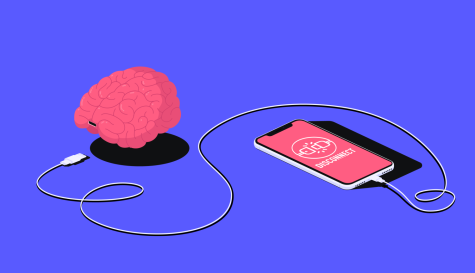Misunderstanding the Dopamine Detox
February 2, 2023

“The goal of the Dopamine Detox process is to help individuals discover healthier outlets, and ultimately overcome or manage their dependencies.”(psychcentral.com) Dr. Cameron Sepah, an Assistant Clinical Professor in UCSF Medical School’s Department of Psychiatry, teaches the inner workings of CBT (cognitive behavioral therapy) & ACT (acceptance commitment therapy). (profiles.ucsf.edu) Doing this, he’s introduced many to the practice of dopamine detoxing. A practice now popularized with the increase of mindfulness culture going mainstream, and with technologies designed to be more addictive. Humans are becoming more dependent on devices and dopamine-producing stimuli, causing many to be attracted to this practice, but how well do we understand this detox?
The dopamine detox is supposedly done as people are given the space to self-reflect and set the intentions to discover the roots of their impulses and their triggers. The detox process begins with recognizing what one is dependent on, and “creating barriers by putting something out of reach or line of sight, making it inconvenient, installing blocking apps/software and limiting time spent with others sharing the habit.” (psychcentral.com) This separation is the bulk of the detox process. After which, one is encouraged to find healthier/beneficial alternatives.
CBT(cognitive behavioral therapy) which often includes detox has been used to combat “-emotional eating, excessive internet usage and gaming, gambling, and shopping, recreational drug dependency”(health.harvard.edu) and several other forms of addiction. Harvard states that this treatment should only be conducted as a response to compulsive and destructive behaviors rather than as a result of uncommonly occurring negative behaviors.
The practice of dopamine detoxing has existed for ages under several names for numerous reasons in spiritual and religious communities. Even many of these practices provide guidelines to achieve an intended result. Often, issues in CBT occurring in large amounts arise when people misinterpret the value of dopamine and overextend the restrictive aspects of the process. This kind of misunderstanding happens as people attempt to remove benign habits from their life or restrict impulsive behaviors that are not harmful to themselves or others in a small or grand scheme. But the CBT philosophy is centered around reaching a life of fulfillment and understanding of the self. Meaning avoidance of pleasure completely is inherently counteractive. The dopamine detox should not be used as a way to over-discipline yourself when on a chemical level, dopamine is not solely responsible for your pleasure. “Your pleasure response is a complex process involving multiple physiological mechanisms. In that cascade of circuitry, dopamine is the neurotransmitter that tells your brain to repeat a behavior.” (psychcentral.com)
To prevent a resurgence of old habits/behaviors and to effectively achieve maintainable results, detoxing should be performed gradually and alongside a licensed professional in most cases. Though, the individual is required to have an understanding of how to handle a relationship with the habit realistically in order to make that transition safely. Dopamine is needed to live healthily. It is “-one of the body’s neurotransmitters, and is involved in our body’s system for reward, motivation, learning, and pleasure. While dopamine does rise in response to rewards or pleasurable activities, it doesn’t actually decrease when you avoid over-stimulating activities, so a dopamine “fast” doesn’t actually lower your dopamine levels.”(health.harvard.edu) Healthy perspectives on this approach require us to understand that dopamine-inducing habits may not be negative in moderation. Finding the balance between over and under-indulgence should be the goal.
Dopamine is only one important component of living healthily. Too much and too little dopamine have had negative effects on mental health and human behavior. Understanding balance and learning to replace destructive behaviors with constructive ones is crucial to self-improvement and maintenance. Detoxing alone cannot fix everything, it’s the permanent changes we make that will reflect the trajectory of our lives.



